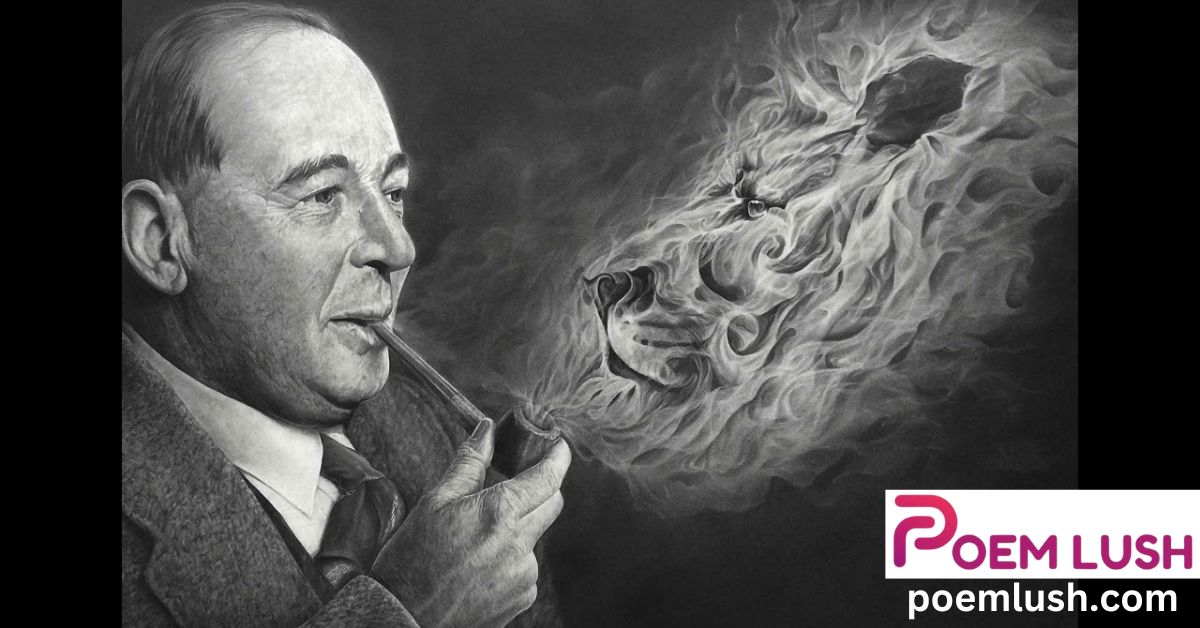Lewis, best known for his timeless works like The Chronicles of Narnia and Mere Christianity, was not only a masterful storyteller and theologian but also a gifted poet. While his prose has earned global recognition, his poetry remains a lesser-known but deeply meaningful part of his literary legacy. A Rich Collection of C.S. Lewis’s Profound Poems A Collection of C.S. Lewis Poems
Lewis’s poems are rich with emotional depth, vivid imagery, and philosophical insight. They reflect his spiritual journey, intellectual curiosity, and literary brilliance, often echoing the same themes found in his more famous works—love, loss, redemption, and the divine. A Rich Collection of C.S. Lewis’s Profound Poems
In this article, we take a closer look at some of his most powerful poems. Each one offers a glimpse into the heart and mind of a man whose thoughts and feelings were as expansive as his imagination. Through his poetry, Lewis invites us into a more intimate conversation—one that challenges, comforts, and enlightens. A Collection of C.S. Lewis Poems
This deeply personal and introspective poem reveals the raw struggle of human selfishness and the painful beauty of spiritual awakening. In it, Lewis confronts his own limitations in love—admitting he has rarely been selfless. He confesses that his desires, even for God, are often tainted by self-interest.
All this is flashy rhetoric about loving you.
I never had a selfless thought since I was born…
Yet, the poem doesn’t end in despair. Lewis acknowledges the redemptive power of love, which teaches him humility and begins to reshape his heart. The image of a heart becoming a bridge, only to break under the weight of change, is poignant and unforgettable. A Rich Collection of C.S. Lewis’s Profound Poems A Collection of C.S. Lewis Poems
For this I bless you as the ruin falls.
The pains you give me are more precious than all other gains.
This poem exemplifies Lewis’s ability to merge raw honesty with spiritual depth, capturing the paradox of divine love and human failure. A Collection of C.S. Lewis Poems
The Apologist’s Evening Prayer

Here, Lewis offers a prayer that is both humble and haunting. Written from the perspective of a Christian thinker, it expresses a deep longing to be free from pride, intellectual vanity, and the illusions of one’s own mind. A Collection of C.S. Lewis Poems
From all my lame defeats and oh! much more
From all the victories that I seemed to score…
Lewis criticizes his own clever arguments and public successes, realizing they may impress people but mean little in God’s eyes. He pleads to be released not only from his doubts but also from his prideful certainties. A Rich Collection of C.S. Lewis’s Profound Poems
Thoughts are but coins. Let me not trust, instead of Thee,
Their thin-worn image of Thy head.
This poem is a prayer for spiritual purity, where Lewis asks to be stripped of all falsehood, even the spiritual ones. It reveals a soul in search of authentic faith. A Collection of C.S. Lewis Poems
Love as Warm Tears
In this emotionally layered piece, Lewis explores the many facets of love. He uses vivid metaphors—tears, fire, spring, and nails—to illustrate love’s warmth, passion, renewal, and pain. Each stanza reveals a different stage or expression of love.
Love’s as warm as tears, Love is tears…
Love’s as fierce as fire, Love is fire…
He does not romanticize love as something easy or gentle. Instead, Lewis acknowledges its power to both uplift and wound. The final stanza, perhaps the most striking, connects love to Christ’s suffering: A Collection of C.S. Lewis Poems
Blunt, thick, hammered through
The medial nerves of One
Who, having made us, knew
The thing He had done…
Here, love is not only beautiful but sacrificial, drawing a profound connection between human love and divine suffering. It’s a deeply theological poem disguised in lyrical elegance. A Rich Collection of C.S. Lewis’s Profound Poems A Collection of C.S. Lewis Poems
The Country of the Blind
This poem steps into the realm of philosophical allegory. In it, Lewis imagines a nation of eyeless people—symbolizing a society that has lost the ability to see or understand truth, beauty, or the divine. It reflects his concern about the modern world’s detachment from deeper realities. A Collection of C.S. Lewis Poems
Hard light bathed them—a whole nation of eyeless men…
The imagery is haunting. These people have become so accustomed to their blindness that they mock the idea of sight. When a person with eyes tries to describe the beauty of the dawn or the ocean, he is not rejected but misunderstood—worse, his truth is diluted and appropriated. A Rich Collection of C.S. Lewis’s Profound Poems
None questioned. It was worse. All would agree
“Of course,” came their answer. “We’ve all felt just like that.” A Collection of C.S. Lewis Poems
Lewis paints a bleak picture of a world where language has lost its meaning and spiritual insight is dismissed as metaphor or myth. This poem is a powerful critique of cultural blindness and spiritual decay.
Of course! Here’s an expanded and reworded version of the three poems: “The Nativity,” “A Footnote to All Prayers,” and “On Being Human.” I’ve preserved the original tone and meaning while adding more descriptive language and depth to enhance the imagery and emotion.
The Nativity (Expanded Version)
Amid the lowing oxen—slow and heavy as I am—
I witness a radiant glory within the humble stable,
A light that steadily grows, casting warmth in the dark,
A divine brilliance that even my sluggish soul
Might one day absorb, transforming my weakness
Into the enduring strength of an ox.
Among the stubborn donkeys—unyielding as myself—
I do not find mere straw or feed, but something far greater:
My Savior, lying in the hay, wrapped in simplicity.
May my beast-like foolishness, thick and unmoving,
At least absorb the calm endurance they display,
And learn, in its clumsiness, a creature’s patience. A Collection of C.S. Lewis Poems
Amid the sheep—straying as I have strayed—
I peer toward the manger where the Holy Child lies.
I watch in awe and longing, and oh, if only
My bleating, foolish heart could draw from this scene
A fragment of that soft and innocent purity,
Like a lamb’s wool, untainted and serene.
A Footnote to All Prayers (Expanded Version)
Only You, O Lord, to whom I bow in reverence,
Truly know the One I attempt to address in prayer.
When I whisper “Thou,” and reach for the sacred,
My thoughts are often tangled in imagined forms—
Classical ideals and symbols too human, too frail,
Things I know are shadows, not Your true face.
Every prayer we utter risks becoming profane,
If taken by You as literal truth; for all worship,
At its heart, is flawed—built from images and dreams,
Born of stories and myth, not reality.
Each soul, in its longing, often speaks to echoes
Of its own unrest, its own fears and desires.
Unless, by Your mercy that draws like a magnet,
You turn our imperfect cries toward Your truth,
We all are idolaters—calling into silence,
Crying out to deaf stone, if You do not intervene.
So, Lord, do not judge us by our broken words.
Translate our trembling metaphors
Into the language of Your great, eternal speech. A Rich Collection of C.S. Lewis’s Profound Poems
On Being Human (Expanded Version)

It is said that angels, with pure and undivided thought,
Grasp the essence of all that is—
They behold Nature’s patterns with perfect clarity.
They see the ideal Forms, untouched by decay,
Unclouded by confusion, direct and unerring—
The pure essence of Earth, the true nature of Stone,
And the grand principles behind all creation,
Standing revealed before their minds like open scrolls.
They understand completely the “tree-ness” of a tree—
How roots dig deep into salted earth,
How the sun’s golden beam draws life upward,
How the sacred rhythm of falling leaves and rising sap
Unfolds the quiet holiness of the forest.
But they do not feel the line where light and shade meet,
Where one steps from sun into the cool comfort of shade.
They do not know the breathless peace of that sensation—
For no angel has a body. No angel has skin.
They perceive the Form of Air with intellectual clarity—
But they do not inhale summer with delight.
They do not drink in the perfume of blooming fields,
Nor revel in the scents of sea wind or firewood’s smoke.
They miss the ripple of memory that rises
With every familiar fragrance from childhood.
They cannot know the ache and joy that scent brings—
For no angel has a nose.
They comprehend life’s mystery, how it grows from death.
But not the sweet delight of spring water on the tongue,
Or the thrill of biting into a warm peach,
Or the heavy, satisfying warmth of a foamy mug.
They do not taste the new loaf’s fragrant softness,
The electric zing of citrus on the tongue—
For no angel has nerves.
Indeed, they are higher beings—richer in knowledge—
But we, too, are gifted. Our senses, our fragile bodies,
Shield us from too much divine radiance,
From glory too fierce to behold unguarded.
And within this narrow chamber—the mind—
God shares His secrets with us alone.
A sacred intimacy, a private knowing,
Reserved for mortal flesh. Not angels,
But us.
Conclusion
C.S. Lewis’s poetry offers a window into the mind of a brilliant thinker whose words continue to inspire, challenge, and comfort readers across generations. This rich collection captures his deep reflections on faith, nature, love, and the human condition. Whether through vivid imagery or quiet contemplation, Lewis’s poems remind us of the beauty and complexity of life. As you journey through his verses, you’ll find not just literary elegance, but also timeless wisdom that speaks to the soul. A Collection of C.S. Lewis Poems
FAQs
What is the significance of C.S. Lewis’s poetry?
C.S. Lewis’s poetry is known for its deep theological, philosophical, and personal reflections. His poems often explore themes of faith, love, loss, and the human experience, offering profound insights into the nature of God and life.
How does C.S. Lewis’s poetry differ from his prose?
While C.S. Lewis’s prose, such as in The Chronicles of Narnia or Mere Christianity, is more direct and analytical, his poetry often delves into more emotive, reflective, and lyrical expressions of his thoughts. It tends to be more personal and less didactic than his prose works.
What are some of C.S. Lewis’s most famous poems?
Some of C.S. Lewis’s most well-known poems include “The Pilgrim’s Regress”, “A Grief Observed”, and “The Apologist’s Evening Prayer”. These poems reflect his spiritual journey and intellectual wrestlings with faith and existence.
Where can I find a collection of C.S. Lewis’s poems?
A comprehensive collection of C.S. Lewis’s poetry can be found in anthologies such as Poems, which includes a range of his poems, and The Collected Poems of C.S. Lewis. These collections offer a rich glimpse into his poetic voice.
Why did C.S. Lewis write poetry?
C.S. Lewis wrote poetry as a means to express his inner thoughts, particularly those that dealt with complex emotional and spiritual matters. His poetry provided a creative outlet to reflect on issues like suffering, joy, faith, and his journey toward belief in God.


